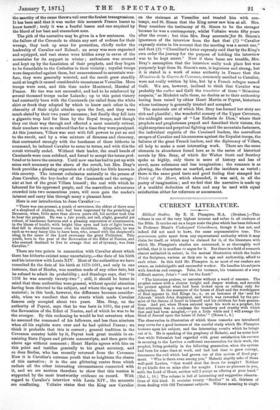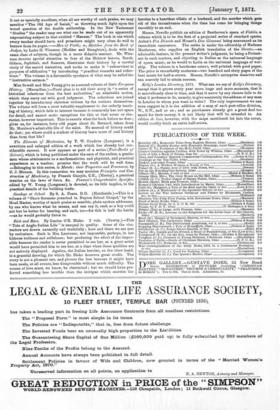CURRENT LITERATURE.
Biblical Studies. By E. H. Plumptre, M.A. (Strahan.)—This volume is one of the very highest interest and value to all students of the Bible. It carries out on a larger scale the plan which has been followed in Professor Blunt's Undesigned Coincidences, though it has not, and indeed did not need to have, the same argumentative tone. The genuineness, quite apart from any supernatural authority which it may claim for itself, or which may be claimed for it, of the literature with which Mr. Plumptre's studies are concerned, is so thoroughly well settled, that it is needless to argue for it. But there is a field of research almost unlimited in extent, in the mutual illustration which the books of the Scripture, various as they are in age and authorship, afford to each other. In this field Mr. Plumptre is, as most of our readers are aware, an indefatigable and successful worker. He handles his subjects with freedom and courage. Take, for instance, his treatment of a very difficult matter, Jehu's " zeal for the Lord."
" The historian praises, or narrates without a word of censure. The prophet comes with a clearer insight and deeper wisdom, and records his protest against what had been looked upon as calling only for admiration. So the massacre of the house of Ahab and the worshippers of Baal appears in 2nd Kings ix., x., as an instance of the ' zeal for Jehovah' which Jehu displayed, and which was rewarded by the pro- mise of the throne of Israel to himself and his children for four genera- tions. And yet, when Hosea entered upon his work as a prophet, his first utterance was to condemn the treachery and cruelty with which that zeal had been mingled,—' yet a little while and I will avenge the blood of Jezreel upon the house of Jahn.' " (Hosea i., 4.) The observation in illustration of which these remarks are introduced may serve for a good instance of the careful study which Mr. Plumptre bestows upon his subject, and the interesting results which he brings out of it. He is speaking of the prophecy of Malachi, and be notes how that while Nehemiah had regarded with great satisfaction his success in securing to the Levites a sufficient remuneration for their work, the prophet living probably in the following generation, when the system had been for some time at work, and had had time to grow corrupt, denounces the evil which had grown out of this system of fixed pay- ment. "who is there even among you," Malachi angrily asks of these well-paid Levites, "that would shut the doors for nought ? Neither do ye kindle fire on mine altar for nought. I have no pleasure in you, saith the Lord of Hosts, neither will I accept an offering at your hand." (Mal. i., 10.) The volume is full of interesting and suggestive observa- tions of this kind. It contains twenty "Studies" in all, thirteen of them dealing with Old Testament subjects. Without meaning to single it out as specially excellent, when all are worthy of such praise, we may mention "The Old Age of Isaiah," as throwing much light upon the vexed question of the double authorship. In the New Testament "Studies" the reader may see what can be made out of an apparently unpromising subject in that entitled " Manaen." The book is one which every teacher should have, and preachers might very often do well to borrow from its pages.—Men of Faith; or, Sketches from the Book of Judges, by Lake H. Wiseman (Hodder and Stoughton), deals with the same class of subjects, though in a more didactic manner. Mr. Wise- man devotes special attention to four of the Hebrew heroes, Barak, Gideon, Jephthah, and Samson, illustrates their history by a careful study of the sacred narrative, and seeks to make it "subservient to purposes of edification" by introducing "practical remarks and reflec- tions." The volume is a favourable specimen of what may be called the "instructive sermon."































 Previous page
Previous page